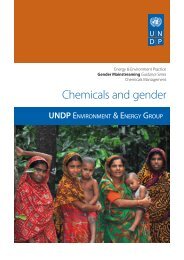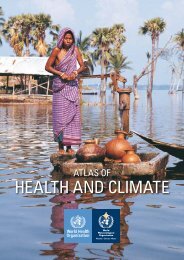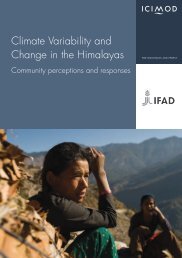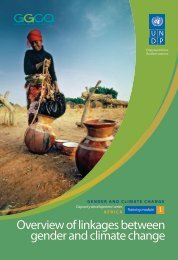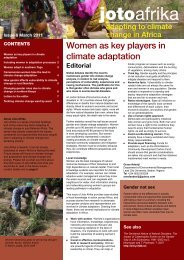Module 4: Gender, Agriculture and Food Security - Gender Climate
Module 4: Gender, Agriculture and Food Security - Gender Climate
Module 4: Gender, Agriculture and Food Security - Gender Climate
- No tags were found...
Create successful ePaper yourself
Turn your PDF publications into a flip-book with our unique Google optimized e-Paper software.
VII<br />
Conclusion<br />
The agriculture sector in Africa is being severely affected by climate change <strong>and</strong><br />
will be even more so in the future. Many women, among the poorest <strong>and</strong> most<br />
vulnerable groups, are particularly hard-hit by these effects. The majority of<br />
women, especially in Africa, are involved in agriculture <strong>and</strong> the sector is crucial<br />
to their livelihoods. On the one h<strong>and</strong>, they play a pivotal role in food production,<br />
food distribution <strong>and</strong> food utilization — the three components of food security —<br />
as well as in various activities that support agricultural development such as soil<br />
<strong>and</strong> water conservation, afforestation <strong>and</strong> crop domestication. On the other h<strong>and</strong>,<br />
they are often constrained heavily by discriminatory policies <strong>and</strong> social norms<br />
that limit their access to productive inputs, assets <strong>and</strong> services. This increases<br />
their vulnerability to food insecurity <strong>and</strong> heavily limits their contributions to<br />
agricultural productivity.<br />
Eliminating gender-based discrimination under the law, ensuring gender-aware<br />
policy <strong>and</strong> programming decisions, <strong>and</strong> giving women a greater voice in decisionmaking<br />
at all levels are important for mainstreaming gender within agriculture<br />
<strong>and</strong> food security programming <strong>and</strong> policy. The increased participation of women<br />
<strong>and</strong> their empowerment, which includes giving them better if not equal access<br />
to resources such as l<strong>and</strong> <strong>and</strong> credit, are essential components of sound social<br />
<strong>and</strong> economic policy. Empowering women can also help improve agricultural<br />
development <strong>and</strong> food security for the community as a whole.<br />
20<br />
<strong>Gender</strong> <strong>and</strong> <strong>Climate</strong> Change Capacity development series Afric a<br />
Training module 4 <strong>Gender</strong>, agriculture <strong>and</strong> food security



